Rashmi Bansal's Blog, page 4
February 27, 2013
The Anandwan Experience
Dr Avinash Saoji completed his MBBS from Government Medical College, Nagpur. Being the college topper he could easily have done a PG but decided then and there that he would not study further. The purpose of his life was not to establish a flourishing medical practice but to be of service to society.
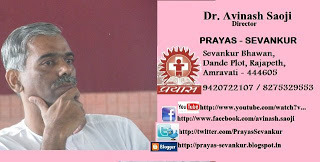
I understood the impact of his work when I arrived at Anandwan on the 22nd of February for the annual Sevankur Youth Motivation camp. For the past couple of years Dr Saoji had been inviting me to attend his camps – in Wardha, in Amravati and so on. Each time due to some or the other commitment, I would politely decline.
To tell you the truth I wasn’t very excited about visiting these somewhat remote parts of Maharashtra.
But Dr Saoji’s gentle persistence paid off. A week before the annual camp I decided to make time and effort – to go and see what Sevankur was all about. I was also keen to visit Anandwan, as I knew of Baba Amte’s pioneering work with leprosy patients. Kuch acchha kaam dekhne ko milega, I thought.
I had no idea though, how amazing – and uplifting - this trip would turn out.
Warora is two hour drive from Nagpur, on a silky-smooth highway. A small signboard points you in the direction of Anandwan. (http://anandwan.in). Nothing had prepared me for the scale of the ashram. (It’s actually more of a ‘township’ spread over 200 hectares where a few hundred people live and work!)
At the ‘Mahamantri hall’ – a giant shed-like structure - I was greeted by Dr Saoji. He was dressed in his trademark white banian and white cotton half-pants (Baba Amte also preferred such clothing – it is ideally suited for the local weather).
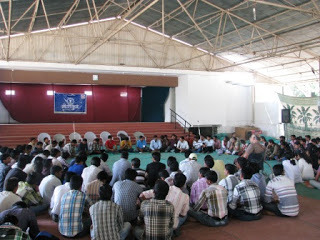
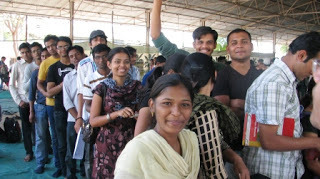
Over 300 students from 30 districts of Maharashtra had gathered by early afternoon. As they introduced themselves one by one it was clear that a majority (around 70%) were from the engineering stream. Medical was the next distinct group (10%) followed by Agriculture, Arts, Science and Commerce.
However they were united by one common objective: to know what is ‘social service’ all about.
The camp was basically organized around a series of ‘sharing’ sessions. The first such session was with Adhik Kadam of ‘Borderless World Foundation'. Adhik is originally from Pune but has spent the last 16 years of his life in Kashmir, where he has set up 4 homes for orphan girls.
He described his journey from ‘fear to fearlessness.’ It started with the curiosity to know what is Kashmir, why does it enjoy special status under the Constitution.
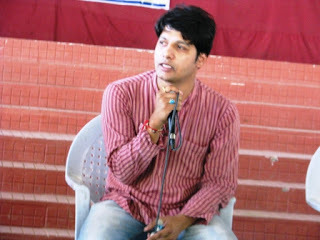
“I went for 2 weeks after my 12th standard exams and stayed on for 3 months.”
Kashmir brought Adhik face to face with the best and worst of humanity. A particular incident which impacted him hugely was watching a truck enter an army camp. He noted a young boy of 16 or 17 dressed in army fatigues mismatched with sports shoes. Seconds later there was a blast.
A piece of human flesh came crashing down on the windscreen of Adhik’s car. The boy was a fidayeen (human bomb).
The incident shook Adhik to the core.
A journalist friend simply said, “Welcome to Kashmir.”
Being a Hindu Adhik was looked at with suspicion. Some maulvis issued a fatwaagainst him. But he persisted in his humanitarian work.
A day came when an AK 47 rifle was pressed against his head. When it might well have been ‘the end’.
But he conversed with the terrorist who held the AK 47. And at the end of 15 minutes the man let him go with these words,“Aap khuda ka kaam kar rahe hain… Aapko jo marega woh sachcha Musalmaan nahi hai.”
Adhik summed up his life as a ‘spiritual journey’ in which apna astitva maine kho diya hai.
Service is about dissolution of the ego state, of being one with the entire world.
The second session by Yajuvendra Mahajan of Deepsthamb foundation which works with rural and semi-urban youth in and around Jalgaon. Teacher training, career counseling, and coaching for competitive examsare its main activities (over 500 candidates have successfully cleared class 1 and class 2 officer jobs in MPSC through Deepsthamb’s efforts).
Yajuvendra is a gifted speaker who exactly knows how to catch the pulse of the audience. He made them laugh, but at the same time made them think. About their own dreams and about the limits they have acceptd to those dreams, by following what the society wants.
“Hamara samaaj ek nautanki samaaj hai,” was his tongue in cheek observation. “The moment I say mee gram sevak the girl’s father will say “wah wah” but my daughter just got engaged.”
Yajuvendra left the students charged up to think beyond a steady job, movies on weekends, house, car and whatnot.
At the end of the session I realised I have been listening to Marathi continuously for 4-5 hours and was enjoying the flow of the language. I am not fluent in speaking but could easily follow most of what was being said.
Dinner, like lunch, was simple dal-chawal-roti-sabzi but satisfying. A cool breeze started blowing as I dropped off to sleep in the dormitory-style guesthouse.
The next morning I woke up early and took a walk around the campus. At 630 am, the place was alive and humming. Men and women were busy sweeping away fallen leaves on the pathways. Children were already dressed and ready for school.
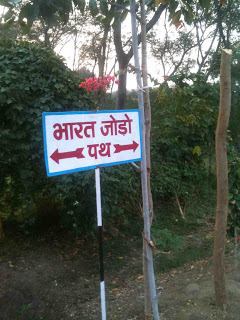
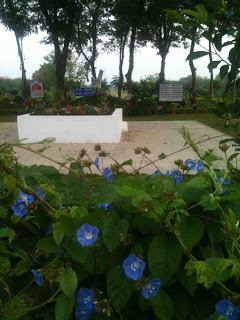
I walked past signs like ‘More Crop per Drop’, down ‘Bharat Jodo’ path to Shraddhawan – the Samadhi spot of Baba Amte and his wife Sadhanatai. It is a beautiful, peaceful spot covered with fresh flowers, standing under this quotation by William Blake:
“I sought my soul, But my soul I could not see.
I sought my God, But my God eluded me.
I sought my brother, And I found all three.”
Baba Amte passed away in 2008, at age 93. Over 57 years, he built Anandwan – an oasis of cure and compassion for those ostracised not only by society but their own families. Leprosy was not a disease, it was considered to be a punishment for sins committed in a previous life.

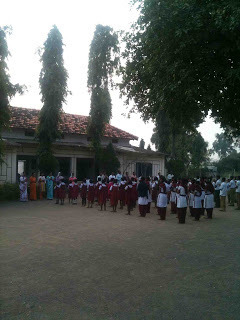
As I watched the sun rising from between the trees, I felt completely at peace. With the leaves. The bushes. The chirping of birds.
As I ambled back I passed the deaf-mute and blind school, where children were neatly assembled for the morning prayer. It was just 7.15 am.
Over breakfast I met Rakhi Patil, a sarpanch of Khadkesim village near Jalgaon. A college lecturer by profession and wife of a Congress party worker she was quite matter of fact that she got this opportunity because of mahila aarakshan.
“Lekin main kisi party ki karyakarta nahin hoon… main sirf logon ka kaam karti hoon,” she clarified.
Rakhiji talked enthusiastically of the many changes she is trying to bring about. The main problem being illiteracy and andhvishwaas. The main problem, she says, is that people want government to give them handouts, instead of doing anything for themselves. Even for the Aadhaar card, people have to be coaxed and convinced and helped with the actual process.
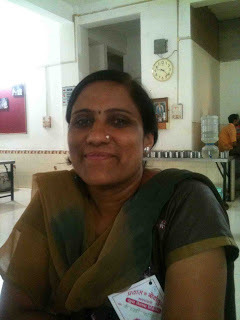
As she spoke about various programs – like daarubandi and police intervention to prevent underage marriage - I felt for the first time that reservation for women is a good idea. This lady would never have got a chance without reservation. But given the opportunity she is doing a lot more than a man would.
“It took more than a year for people to accept me,” she says matter of factly. Equations of caste and gender are not easy to rewrite but sincerity and stubbornness ultimately pays.
That’s the story of Dr Sangram Patil and Dr Nupur Patil as well. Both highly qualified doctors from BJ Medical college with post-graduate degrees from London, the Patils returned to India 4 years ago and set up a practice at Erandwan near Jalgaon.
“Our son was born in UK, had we stayed one more year we would have got British citizenship but we took a decision to come back. We did not want to become British doctors working in India but remain Indian and work in India, where aamhi garaz aahe (where we are needed).
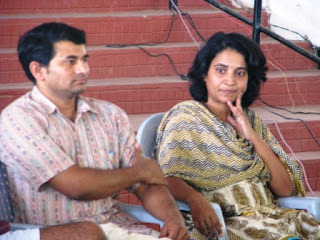 However the punchline of the Sangram-Nupur story was not professional but personal. The two met in medical college, where Sangram proposed to Nupur at the end of the first year but was flatly rejected. The reason being that they came from different castes.
However the punchline of the Sangram-Nupur story was not professional but personal. The two met in medical college, where Sangram proposed to Nupur at the end of the first year but was flatly rejected. The reason being that they came from different castes.
Sangram persisted, Nupur resisted. But then, after a year of saying no, no and no, she melted. Now the problem came from Sangram’s family – prachand virodh. Nupur being not just from a different caste but a scheduled caste, and a practicing Buddhist.
Sangram and Nupur decided to have a (secret) registered marriage in the presence of friends. On the day that his sister got married, Sangram took his jijaji aside and explained the situation to him. All hell broke loose and the young couple – still studying for their degrees – was left to fend for themselves.
I often read in newspapers about such issues but hearing it from the horse’s mouth was different. To see this young couple bonded by love as well a greater common purpose was inspiring and gave me hope. That things can change.
My own session was also well-received. I spoke in Hindi, the audience was attentive and asked a lot of questions. All had heard of my books though only a few had read them.
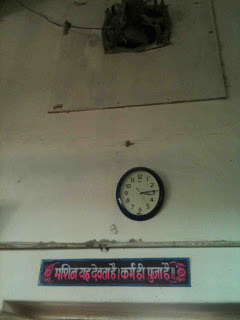
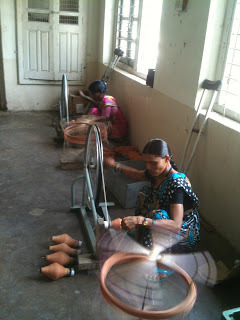
In the afternoon, we had a short tour of Anandwan. Through the many workshops which keep residents busy – making cloth, leather shoes, foam bags and hand-cranked wheelchairs for the handicapped.
‘Shram hi Shriram hai’ was Baba Amte’s slogan. Whether you are handicapped or deaf or blind, you can contribute and earn your living – and self-respect. That was the message of the Anandwan Orchestra, a unique experiment started in 2002 by Dr Vikas Amte. Every member of this orchestra is ‘lacking’ in some sense but united by the language of music.
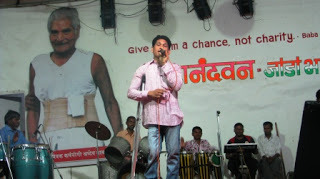
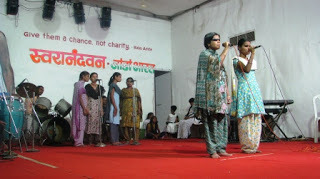
The one hour program they put up was exhilarating to the extreme. (The Anandwan orchestra tours around the country and I do wish that college festival organisers take note and invite them. You must experience the show once! Plus, the fee you pay funds several good causes.)
It was time to leave. I said goodbye to the many interesting characters I had met. From Santosh – the lad from Beed who has taken 44 orphans under his wing to Devendra – who is training the youth of Gondia to get jobs at CCD and McDonalds in Pune.
As I waited for the ST bus on the highway, there was thunder and lightning in the air. But the rain started only after I was safely in the vehicle. There was no seat vacant but the conductor was kind enough to offer his own.
I thought – these are the blessings of Baba. I was meant to come here not just to share and to contribute to these young people. But to understand what the ‘real India’ is all about.
Epilogue and Action Point
Baba Amte’s story is magnificent and many books have been written about him (esp. in Marathi). But our present-day English speaking urban population does not know about him or the work which is still continuing - at Anandwan, at Hemalkasa and Somnath.
I would like to help in spreading his life's work and his vichaardhaara in some small way.
At the same time, these young boys and girls I met - and thousands like them out there – need inspiration. Stories of sons and daughters of the soil, from vernacular schools and regional colleges but who dreamt big for themselves and for others.
I thought – I must look into writing such a book - in Marathi, for Marathi youth.
I cannot do it alone. I need the help of many of you out there:
1) To refer such stories, from all over the state.
2) A Marathi tutor and/or a Rapidex-style home-study course.
3) Transcription + translation of interviews in Marathi.
If you are interested in any of the above drop me a line at rashmi_b AT yahoo.com


I understood the impact of his work when I arrived at Anandwan on the 22nd of February for the annual Sevankur Youth Motivation camp. For the past couple of years Dr Saoji had been inviting me to attend his camps – in Wardha, in Amravati and so on. Each time due to some or the other commitment, I would politely decline.
To tell you the truth I wasn’t very excited about visiting these somewhat remote parts of Maharashtra.
But Dr Saoji’s gentle persistence paid off. A week before the annual camp I decided to make time and effort – to go and see what Sevankur was all about. I was also keen to visit Anandwan, as I knew of Baba Amte’s pioneering work with leprosy patients. Kuch acchha kaam dekhne ko milega, I thought.
I had no idea though, how amazing – and uplifting - this trip would turn out.
Warora is two hour drive from Nagpur, on a silky-smooth highway. A small signboard points you in the direction of Anandwan. (http://anandwan.in). Nothing had prepared me for the scale of the ashram. (It’s actually more of a ‘township’ spread over 200 hectares where a few hundred people live and work!)
At the ‘Mahamantri hall’ – a giant shed-like structure - I was greeted by Dr Saoji. He was dressed in his trademark white banian and white cotton half-pants (Baba Amte also preferred such clothing – it is ideally suited for the local weather).


Over 300 students from 30 districts of Maharashtra had gathered by early afternoon. As they introduced themselves one by one it was clear that a majority (around 70%) were from the engineering stream. Medical was the next distinct group (10%) followed by Agriculture, Arts, Science and Commerce.
However they were united by one common objective: to know what is ‘social service’ all about.
The camp was basically organized around a series of ‘sharing’ sessions. The first such session was with Adhik Kadam of ‘Borderless World Foundation'. Adhik is originally from Pune but has spent the last 16 years of his life in Kashmir, where he has set up 4 homes for orphan girls.
He described his journey from ‘fear to fearlessness.’ It started with the curiosity to know what is Kashmir, why does it enjoy special status under the Constitution.

“I went for 2 weeks after my 12th standard exams and stayed on for 3 months.”
Kashmir brought Adhik face to face with the best and worst of humanity. A particular incident which impacted him hugely was watching a truck enter an army camp. He noted a young boy of 16 or 17 dressed in army fatigues mismatched with sports shoes. Seconds later there was a blast.
A piece of human flesh came crashing down on the windscreen of Adhik’s car. The boy was a fidayeen (human bomb).
The incident shook Adhik to the core.
A journalist friend simply said, “Welcome to Kashmir.”
Being a Hindu Adhik was looked at with suspicion. Some maulvis issued a fatwaagainst him. But he persisted in his humanitarian work.
A day came when an AK 47 rifle was pressed against his head. When it might well have been ‘the end’.
But he conversed with the terrorist who held the AK 47. And at the end of 15 minutes the man let him go with these words,“Aap khuda ka kaam kar rahe hain… Aapko jo marega woh sachcha Musalmaan nahi hai.”
Adhik summed up his life as a ‘spiritual journey’ in which apna astitva maine kho diya hai.
Service is about dissolution of the ego state, of being one with the entire world.
The second session by Yajuvendra Mahajan of Deepsthamb foundation which works with rural and semi-urban youth in and around Jalgaon. Teacher training, career counseling, and coaching for competitive examsare its main activities (over 500 candidates have successfully cleared class 1 and class 2 officer jobs in MPSC through Deepsthamb’s efforts).
Yajuvendra is a gifted speaker who exactly knows how to catch the pulse of the audience. He made them laugh, but at the same time made them think. About their own dreams and about the limits they have acceptd to those dreams, by following what the society wants.
“Hamara samaaj ek nautanki samaaj hai,” was his tongue in cheek observation. “The moment I say mee gram sevak the girl’s father will say “wah wah” but my daughter just got engaged.”
Yajuvendra left the students charged up to think beyond a steady job, movies on weekends, house, car and whatnot.
At the end of the session I realised I have been listening to Marathi continuously for 4-5 hours and was enjoying the flow of the language. I am not fluent in speaking but could easily follow most of what was being said.
Dinner, like lunch, was simple dal-chawal-roti-sabzi but satisfying. A cool breeze started blowing as I dropped off to sleep in the dormitory-style guesthouse.
The next morning I woke up early and took a walk around the campus. At 630 am, the place was alive and humming. Men and women were busy sweeping away fallen leaves on the pathways. Children were already dressed and ready for school.


I walked past signs like ‘More Crop per Drop’, down ‘Bharat Jodo’ path to Shraddhawan – the Samadhi spot of Baba Amte and his wife Sadhanatai. It is a beautiful, peaceful spot covered with fresh flowers, standing under this quotation by William Blake:
“I sought my soul, But my soul I could not see.
I sought my God, But my God eluded me.
I sought my brother, And I found all three.”
Baba Amte passed away in 2008, at age 93. Over 57 years, he built Anandwan – an oasis of cure and compassion for those ostracised not only by society but their own families. Leprosy was not a disease, it was considered to be a punishment for sins committed in a previous life.


As I watched the sun rising from between the trees, I felt completely at peace. With the leaves. The bushes. The chirping of birds.
As I ambled back I passed the deaf-mute and blind school, where children were neatly assembled for the morning prayer. It was just 7.15 am.
Over breakfast I met Rakhi Patil, a sarpanch of Khadkesim village near Jalgaon. A college lecturer by profession and wife of a Congress party worker she was quite matter of fact that she got this opportunity because of mahila aarakshan.
“Lekin main kisi party ki karyakarta nahin hoon… main sirf logon ka kaam karti hoon,” she clarified.
Rakhiji talked enthusiastically of the many changes she is trying to bring about. The main problem being illiteracy and andhvishwaas. The main problem, she says, is that people want government to give them handouts, instead of doing anything for themselves. Even for the Aadhaar card, people have to be coaxed and convinced and helped with the actual process.

As she spoke about various programs – like daarubandi and police intervention to prevent underage marriage - I felt for the first time that reservation for women is a good idea. This lady would never have got a chance without reservation. But given the opportunity she is doing a lot more than a man would.
“It took more than a year for people to accept me,” she says matter of factly. Equations of caste and gender are not easy to rewrite but sincerity and stubbornness ultimately pays.
That’s the story of Dr Sangram Patil and Dr Nupur Patil as well. Both highly qualified doctors from BJ Medical college with post-graduate degrees from London, the Patils returned to India 4 years ago and set up a practice at Erandwan near Jalgaon.
“Our son was born in UK, had we stayed one more year we would have got British citizenship but we took a decision to come back. We did not want to become British doctors working in India but remain Indian and work in India, where aamhi garaz aahe (where we are needed).
 However the punchline of the Sangram-Nupur story was not professional but personal. The two met in medical college, where Sangram proposed to Nupur at the end of the first year but was flatly rejected. The reason being that they came from different castes.
However the punchline of the Sangram-Nupur story was not professional but personal. The two met in medical college, where Sangram proposed to Nupur at the end of the first year but was flatly rejected. The reason being that they came from different castes.Sangram persisted, Nupur resisted. But then, after a year of saying no, no and no, she melted. Now the problem came from Sangram’s family – prachand virodh. Nupur being not just from a different caste but a scheduled caste, and a practicing Buddhist.
Sangram and Nupur decided to have a (secret) registered marriage in the presence of friends. On the day that his sister got married, Sangram took his jijaji aside and explained the situation to him. All hell broke loose and the young couple – still studying for their degrees – was left to fend for themselves.
I often read in newspapers about such issues but hearing it from the horse’s mouth was different. To see this young couple bonded by love as well a greater common purpose was inspiring and gave me hope. That things can change.
My own session was also well-received. I spoke in Hindi, the audience was attentive and asked a lot of questions. All had heard of my books though only a few had read them.


In the afternoon, we had a short tour of Anandwan. Through the many workshops which keep residents busy – making cloth, leather shoes, foam bags and hand-cranked wheelchairs for the handicapped.
‘Shram hi Shriram hai’ was Baba Amte’s slogan. Whether you are handicapped or deaf or blind, you can contribute and earn your living – and self-respect. That was the message of the Anandwan Orchestra, a unique experiment started in 2002 by Dr Vikas Amte. Every member of this orchestra is ‘lacking’ in some sense but united by the language of music.


The one hour program they put up was exhilarating to the extreme. (The Anandwan orchestra tours around the country and I do wish that college festival organisers take note and invite them. You must experience the show once! Plus, the fee you pay funds several good causes.)
It was time to leave. I said goodbye to the many interesting characters I had met. From Santosh – the lad from Beed who has taken 44 orphans under his wing to Devendra – who is training the youth of Gondia to get jobs at CCD and McDonalds in Pune.
As I waited for the ST bus on the highway, there was thunder and lightning in the air. But the rain started only after I was safely in the vehicle. There was no seat vacant but the conductor was kind enough to offer his own.
I thought – these are the blessings of Baba. I was meant to come here not just to share and to contribute to these young people. But to understand what the ‘real India’ is all about.
Epilogue and Action Point
Baba Amte’s story is magnificent and many books have been written about him (esp. in Marathi). But our present-day English speaking urban population does not know about him or the work which is still continuing - at Anandwan, at Hemalkasa and Somnath.
I would like to help in spreading his life's work and his vichaardhaara in some small way.
At the same time, these young boys and girls I met - and thousands like them out there – need inspiration. Stories of sons and daughters of the soil, from vernacular schools and regional colleges but who dreamt big for themselves and for others.
I thought – I must look into writing such a book - in Marathi, for Marathi youth.
I cannot do it alone. I need the help of many of you out there:
1) To refer such stories, from all over the state.
2) A Marathi tutor and/or a Rapidex-style home-study course.
3) Transcription + translation of interviews in Marathi.
If you are interested in any of the above drop me a line at rashmi_b AT yahoo.com

Published on February 27, 2013 04:14
February 8, 2013
Lincoln - what a man and what a movie!
My daughter does not like studying history. And I don’t blame her. The way history is taught, it’s just a collections of names, facts and dates. We rarely see the human beings behind the ‘heros’ and the ‘villains’, victory and defeat.
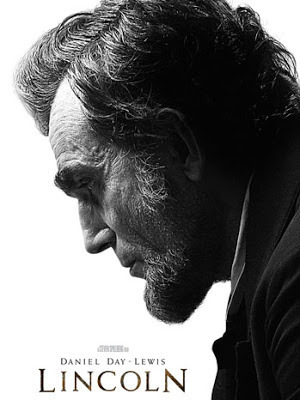 That’s why a movie like ‘Lincoln’ is so important.
That’s why a movie like ‘Lincoln’ is so important.
That’s why it literally blew my mind.
Lincoln is revered today for being the President who abolished slavery in the United States. But who among us knew how it actually happened.
How members of his own party were against the idea.
How he had to woo Congressmen of the opposition party to get a 2/3rd majority in the House.
And within all this, his own problems in his own family, especially with his teenage son who was hellbent on joining the army, much against Mrs Lincoln’s wishes.
This is a wise and wonderful film, based on facts, but bringing alive how history was made. History was made because one man took a stand. Even though he could have taken the easy way out.
The Confederate army, after four years of fighting, was weary and ready to surrender. But Lincoln stalled peace talks.
He was convinced that if the war ended, slavery would continue.
But if Congress could be convinced that the only way to end the war was to first abolish slavery, a greater, more lasting victory would be the result.
To achieve this victory, Lincoln the statesman became Lincoln the politician. He authorized the trading of favours to get the required votes.
He employed personal charisma and quiet persuasion where favours did not work.
As we all know, ultimately the 13th Amendment to the American Constitution was passed and slavery was abolished. By two votes.
‘Lincoln’ is a film with a multitude of characters, but somehow you never get confused.
It’s a film where characters talk and talk, and yet it’s not dialoguebaazi.
The English they use is not what we use today – words like ‘cohere’ for example – but they suit the characters.
Screenplay writer Tony Kushner also took the liberty of creating some ‘Lincolnese’ - words that mean nothing but sound just right in the given context.
The film is partly based on the book ‘A Team of Rivals’ by historian Doris Goodwin but the writer has taken minor liberties with facts and invented dialogues, as any writer of historical drama must.
Lincoln's penchant for telling stories and the scenes where Congressmen trade gentlemanly insults are a treat to watch.
The film, however, belongs to Daniel Day Lewis.
He is Lincoln. Period. From his gait, to the gravelly voice, which he took months to create and perfect.
The man is sure to win his third Oscar for this performance.
I don’t think the movie will attract too many viewers in India because American history is an alien subject to us. But the film is worth watching for its relevance to our problems, our politics.
The biggest lesson of Lincoln is that to do good, you sometimes have to be crafty. Idealism is well and good but getting the desired result is what ultimately matters.
Thaddeus Stevens is an idealist, a Congressman who believes that all men are truly created equal. Declaring this, however, will ruin the chance of passing the 13th Amendment.
Lincoln says to him: “A compass, I learnt when I was surveying, it'll... it'll point you True North from where you're standing, but it's got no advice about the swamps and desert and chasm that you'll encounter along the way. If in pursuit of your destination, you plunge ahead, heedless of obstacles, and achieve nothing more than to sink in a swamp... What's the use of knowing True North?"
Stevens takes a more moderate stand and the amendment is passed. He later remarks: “The most liberating constitutional amendment in history, passed by corruption, aided and abetted by the purest man in America.”
The idealists in our country would do well to learn from that.
And our Prime Minister, who the country believes is not corrupt. But what point is purity unless you stand for some principle?
A principle for which you would do anything, risk anything.
And create a place in history, not just tomorrow’s headline.

 That’s why a movie like ‘Lincoln’ is so important.
That’s why a movie like ‘Lincoln’ is so important. That’s why it literally blew my mind.
Lincoln is revered today for being the President who abolished slavery in the United States. But who among us knew how it actually happened.
How members of his own party were against the idea.
How he had to woo Congressmen of the opposition party to get a 2/3rd majority in the House.
And within all this, his own problems in his own family, especially with his teenage son who was hellbent on joining the army, much against Mrs Lincoln’s wishes.
This is a wise and wonderful film, based on facts, but bringing alive how history was made. History was made because one man took a stand. Even though he could have taken the easy way out.
The Confederate army, after four years of fighting, was weary and ready to surrender. But Lincoln stalled peace talks.
He was convinced that if the war ended, slavery would continue.
But if Congress could be convinced that the only way to end the war was to first abolish slavery, a greater, more lasting victory would be the result.
To achieve this victory, Lincoln the statesman became Lincoln the politician. He authorized the trading of favours to get the required votes.
He employed personal charisma and quiet persuasion where favours did not work.
As we all know, ultimately the 13th Amendment to the American Constitution was passed and slavery was abolished. By two votes.
‘Lincoln’ is a film with a multitude of characters, but somehow you never get confused.
It’s a film where characters talk and talk, and yet it’s not dialoguebaazi.
The English they use is not what we use today – words like ‘cohere’ for example – but they suit the characters.
Screenplay writer Tony Kushner also took the liberty of creating some ‘Lincolnese’ - words that mean nothing but sound just right in the given context.
The film is partly based on the book ‘A Team of Rivals’ by historian Doris Goodwin but the writer has taken minor liberties with facts and invented dialogues, as any writer of historical drama must.
Lincoln's penchant for telling stories and the scenes where Congressmen trade gentlemanly insults are a treat to watch.
The film, however, belongs to Daniel Day Lewis.
He is Lincoln. Period. From his gait, to the gravelly voice, which he took months to create and perfect.
The man is sure to win his third Oscar for this performance.
I don’t think the movie will attract too many viewers in India because American history is an alien subject to us. But the film is worth watching for its relevance to our problems, our politics.
The biggest lesson of Lincoln is that to do good, you sometimes have to be crafty. Idealism is well and good but getting the desired result is what ultimately matters.
Thaddeus Stevens is an idealist, a Congressman who believes that all men are truly created equal. Declaring this, however, will ruin the chance of passing the 13th Amendment.
Lincoln says to him: “A compass, I learnt when I was surveying, it'll... it'll point you True North from where you're standing, but it's got no advice about the swamps and desert and chasm that you'll encounter along the way. If in pursuit of your destination, you plunge ahead, heedless of obstacles, and achieve nothing more than to sink in a swamp... What's the use of knowing True North?"
Stevens takes a more moderate stand and the amendment is passed. He later remarks: “The most liberating constitutional amendment in history, passed by corruption, aided and abetted by the purest man in America.”
The idealists in our country would do well to learn from that.
And our Prime Minister, who the country believes is not corrupt. But what point is purity unless you stand for some principle?
A principle for which you would do anything, risk anything.
And create a place in history, not just tomorrow’s headline.

Published on February 08, 2013 09:25
January 24, 2013
Thoda namak shamak
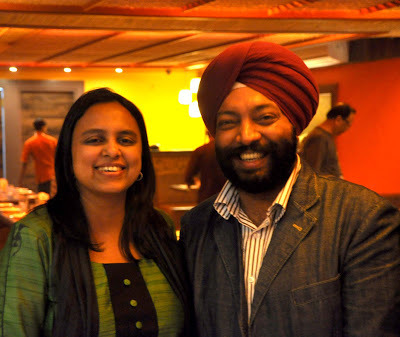 Once in a way, you meet a person so passionate about their work that it is reflected in everything he says, everything he does.
Once in a way, you meet a person so passionate about their work that it is reflected in everything he says, everything he does.Harpal Singh Sokhi is one such.
When he was first introduced to me, I had no idea who he was. Except that he is a chef who’s worked with Sanjeev Kapoor, now opening his own chain of restaurants.
Big deal.
It was only when the food started arriving on the table that I realised yahan kuch alag funda hai. First came the lassi in cutting chai style. Four different kinds.
Then, the starters. Kya gazab! Not the usual paneer tikkas and hariyali kebabs but some amazing variations. Like 'beetroot and amla'.
I looked at Sardarji more carefully and understood – yeh bhaisaab kuch khaas hain.
Harpal Singh Sokhi is a celebrity chef, but the nicest possible kind.
He is popularly known as the ‘namak shamak’ chef because that’s the trademark phrase on his cooking show ‘Turban Tadka’.
It’s something he chose – deliberately and intelligently. In a world where chefs talk in terms of teaspoons, he picks up a chutki (fingerful) of salt and sprinkles it on his cooking – just like your mother does.
Endearing him to aunties and beejis and didis of all varieties.
“I always look at what is the season, what are the vegetables available in that season. And I plan what to air on my show, accordingly.”
No exotic, hard-to-find ingredients. No Masterchef pretensions. Only an incredible love and understanding of food.
“I have an ayurvedic doctor who is my consultant, he has helped me to create a Punjabi food menu which is lighter on the stomach, easier to digest.”
Is such a thing possible?
Harpal elaborates,”See, if we cook in white butter (butter without salt), that is better for digestion. Adding black pepper also makes a difference.”
I loooooooove white butter. Jai ayurveda, jai Punjab.
Harpal has been in the hospitality business for over two decades. And he has a really sad but funny story to tell about what happened when he decided to take up cooking – as a career.
“I grew up in Kharagpur, where there is only one ambition of every parent – my child should join IIT.”
The second best option was to become an Air Force pilot.
The last (respectable) option – join the Indian Railways (Kharagpur’s only other claim to fame being its endlessly long platform).
Since Harpal showed very little interest in studies, all the above options were ruled out. His father thought a clerical option in a bank might be worth a shot.
“I was sent for typing classes in the middle of the afternoon,” he laughs. “Yes, I can type really really fast even today.”
One of Harpal’s seniors had joined a hotel management course and started working at Sinclair’s hotel in Darjeeling. When he came home for vacation – smartly dressed in suit and tie – Harpal was impressed.
And he too joined IHM Bhubaneshwar.
When he came for vacation his father wanted to know wahaan kya sikhate hain. Tu kya banega?
“(S)hef,” replied Harpal.
“Yeh chuff kya hota hai.”
“If I tell you will get mad,” replied Harpal.
“Nahin, batao to sahi,” urged papaji.
“Chef matlab bawarchi.”
Papaji was mad and stayed that way for a long time. Over time, he accepted that this work is like any other work – pays well and worth doing. But it was seeing his son on television that really made him proud.
Parents are like that only.
In his 20 odd years as a ‘diplomewala bawarchi’ Harpal has seen it and done it all. Travelled and worked around the world, collected the oddest of experiences.
“People abroad are fascinated by my turban. There was one restaurant in Luxembourg where I worked. Guests would come into the kitchen to touch me and see if I am ‘real’.”
Well, I can tell you this guy is for real. His food is for real. Really really good.
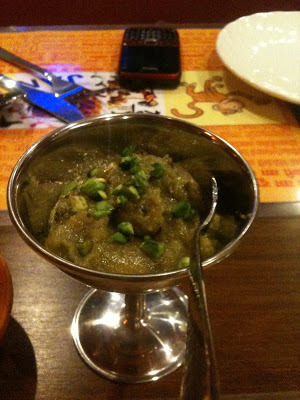 The starters at ‘The Funjabi Tadka’ were so good we never got to the main course. We only had space for some home-style khichdi. And of course, dessert.
The starters at ‘The Funjabi Tadka’ were so good we never got to the main course. We only had space for some home-style khichdi. And of course, dessert.What I liked best were the chocolate-mango lassi, the Lahori aloo and the ‘Mirchi ka halwa’ (yes, you read that right and it’s amazing! (pictured alongside)
But the entire menu is full of such interesting things (familiar and yet different). What’s more they have a separate menu for vegetarians which I think is a wonderful insight into the mind of us shakaharis..
It was a pleasure to meet Harpal and share this meal. I can tell that this restaurant is going to be a huge success. Because it’s all about the food, the food and the food.
'The Funjabi Tadka’ (TFT) opened in Kolkata on Southern Avenue on 19th of Jan. Will open in Mumbai (Bandra) and very soon in other locations across India. www.facebook.com/funjabitadka
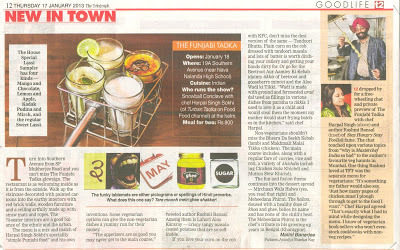 The meal I had was a preview, arranged for by my friend Aneeta Arora. Many thanks to Satyaki Mukherjee, business brain behind TFT. Coverage by The Telegraph newspaper on the 17th of January featured above.
The meal I had was a preview, arranged for by my friend Aneeta Arora. Many thanks to Satyaki Mukherjee, business brain behind TFT. Coverage by The Telegraph newspaper on the 17th of January featured above. Advice to wannabe 'chuffs'
Hotel management was not so well accepted as a career around 20 years ago, but that’s changed.
I see hotel management as the only course from where you can fit into any stream -it’s like one size fits all. You will see hotel management graduates heading retail chains as well as sitting in senior positions in sectors apart from their own domain.
Not to forget that if you graduate from a hotel school your entrepreneurship skills are at their best. Because the first thing in the mind of a person just about graduating is ‘I will have my own restaurant someday’.
The secret of success in any field is to work hard. Though many complete the course, later they change their profession as it involves long hours of work.
You need to fall in love with your profession to become successful.
In hotel management one has to reach out to people as it is service oriented. You need to make your presence felt in everything you do. You cannot sit behind and wait for things to happen.
As a chef, apart from cooking good food, I always reach out to the guests and talk to them, get to know them, their likes and dislikes. This helped me when I did my shows too. So I strongly advise everyone who intends taking up the course should be an extrovert – friendly and approachable.

Published on January 24, 2013 06:17
January 19, 2013
So you want to write a bestseller?
The Economic Times ran a story yesterday on ‘How Amish Tripathi’s success is prompting MBA grads to become novelists'.
The article – and many others like it – imply that MBAs have a higher chance of success in the writing profession than non-MBAs.
In support of this theory the article quotes this fact: Of the top 10 books in the shortlist for The Economist Crossword Book Award in October 2012, seven had been penned by MBAs, six of whom were IIM alumni.
I think the more important fact which readers will miss is the part where Amish mentions he comes from a ‘typical middle class family;’. The top-selling authors in India today would all use that phrase to describe themselves.
It’s typical middle class - writing for typical middle class - that’s selling.
The other qualities that I believe make for success are:
1) being pigheaded (believing in your story and way of writing when no one else will)
2) being ahead of your time (what you’ve written has not been seen before or done before)
3) being I-don’t-give-a-damn (I started doing this for fun, not to make serious money or a big career).
These are the qualities you should look for in yourself when you ask – can I make a career in writing. If you are any old boring MBA writing a book that sounds very much like Chetan or Amish or Ravinder or mine, it is not going to work.
If you are confident, crazy and committed to writing – you have a shot.
You will need to collect life-experiences and opinions and attitudes but it need not be at a bschool.
Most importantly, you need to train yourself to connect with a source higher than yourself. Because the best artists of all kinds freely acknowledge – they are but instruments through whom the words, the songs, the art and ideas flow.
Robert Louis Stevenson (‘Treasure Island’) conceived of entire novels through dreams.
Elizabeth Gilbert (‘Eat, Pray, Love’) gives a brilliant TED talk in which she argues that creativity is divinely inspired. I love the part about ‘genius’ being like Dobby, the house elf.
Amish Tripathi says that writing his books is like a ‘joyful ride’.
The book itself would just keep coming. The only thing I had to do was to listen to music, which (matched) the mood of the moment that I am writing in. So if I were writing a war scene I would listen to the music of Eklavya (starring Amitabh Bachchan, Saif Ali Khan and Vidya Balan). And somehow that used to help the flow. When I would write a love scene I'd listen to the music of Don (starring Shah Rukh Khan).
That's all I had to do: play music and somehow the story would just start flowing. And there wasn't any logic to it. Sometimes I would write chapter 25, the next day I would write chapter five. The next day something of book three would come. I learned not to question it and would write just what came to me. I first wrote summaries of the three books and then I started expanding them into the books.
I don’t mean to say that if you switch on your favourite music a bestseller will flow out of you. But at some point, it can.
The tension with being a creative professional is that you have to work very hard in order to hardly work at all.
If you can understand that, you can be a writer. And your books will sell.
What you need is not an MBA but to discover the true power – of your mind.

The article – and many others like it – imply that MBAs have a higher chance of success in the writing profession than non-MBAs.
In support of this theory the article quotes this fact: Of the top 10 books in the shortlist for The Economist Crossword Book Award in October 2012, seven had been penned by MBAs, six of whom were IIM alumni.
I think the more important fact which readers will miss is the part where Amish mentions he comes from a ‘typical middle class family;’. The top-selling authors in India today would all use that phrase to describe themselves.
It’s typical middle class - writing for typical middle class - that’s selling.
The other qualities that I believe make for success are:
1) being pigheaded (believing in your story and way of writing when no one else will)
2) being ahead of your time (what you’ve written has not been seen before or done before)
3) being I-don’t-give-a-damn (I started doing this for fun, not to make serious money or a big career).
These are the qualities you should look for in yourself when you ask – can I make a career in writing. If you are any old boring MBA writing a book that sounds very much like Chetan or Amish or Ravinder or mine, it is not going to work.
If you are confident, crazy and committed to writing – you have a shot.
You will need to collect life-experiences and opinions and attitudes but it need not be at a bschool.
Most importantly, you need to train yourself to connect with a source higher than yourself. Because the best artists of all kinds freely acknowledge – they are but instruments through whom the words, the songs, the art and ideas flow.
Robert Louis Stevenson (‘Treasure Island’) conceived of entire novels through dreams.
Elizabeth Gilbert (‘Eat, Pray, Love’) gives a brilliant TED talk in which she argues that creativity is divinely inspired. I love the part about ‘genius’ being like Dobby, the house elf.
Amish Tripathi says that writing his books is like a ‘joyful ride’.
The book itself would just keep coming. The only thing I had to do was to listen to music, which (matched) the mood of the moment that I am writing in. So if I were writing a war scene I would listen to the music of Eklavya (starring Amitabh Bachchan, Saif Ali Khan and Vidya Balan). And somehow that used to help the flow. When I would write a love scene I'd listen to the music of Don (starring Shah Rukh Khan).
That's all I had to do: play music and somehow the story would just start flowing. And there wasn't any logic to it. Sometimes I would write chapter 25, the next day I would write chapter five. The next day something of book three would come. I learned not to question it and would write just what came to me. I first wrote summaries of the three books and then I started expanding them into the books.
I don’t mean to say that if you switch on your favourite music a bestseller will flow out of you. But at some point, it can.
The tension with being a creative professional is that you have to work very hard in order to hardly work at all.
If you can understand that, you can be a writer. And your books will sell.
What you need is not an MBA but to discover the true power – of your mind.

Published on January 19, 2013 10:50
January 17, 2013
Follow Every Rainbow - my 5th book!
Happy to share with you news of my new book on women entrepreneurs, which releases on the 8th of March, 2013. Here is a sneak peek of the cover (even before it goes up on flipkart :)
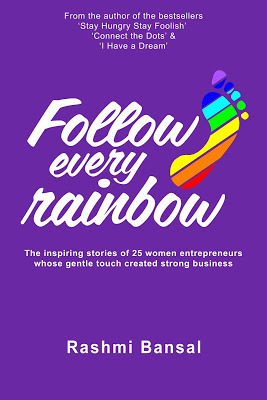 The title 'Follow Every Rainbow' is inspired by one of my all-time favourite songs, from 'The Sound of Music'.
The title 'Follow Every Rainbow' is inspired by one of my all-time favourite songs, from 'The Sound of Music'.
Climb every mountain,
Ford every stream,
Follow every rainbow,
'Till you find your dream.
A dream that will need
All the love you can give,
Every day of your life
For as long as you live.
I chose this title because I think it describes the way women look at their lives and careers. We don't want to climb *every* mountain. Just because it's there.
We need to see that rainbow over the horizon. To pursue a dream with beauty and hope and inspiration. And not just power, status, money or 'success' - at any cost.
Incidentally, the cover of 'Follow Every Rainbow' is designed by the talented Amrit Vatsa, who also designed 'Stay Hungry Stay Foolish' and 'Connect the Dots'.
Deciding what colour to use for the cover was a challenge. We didn't want a girly pink but neither did we want stark white. I think the 'deep purple' we finally chose is a beautiful, royal colour. Quite like the women entrepreneurs themselves.
I also like the motif of the 'rainbow' foot. It's symbolic of moving ahead, taking a step in the direction you want your life to go. (I might even do some t-shirts to give away!)
For all those of you who ping me or mail me asking when I will update the blog, the answer is - very soon. Writing a book is work. Writing two books a year is a LOT of work. By the way, I plan to write three!
So I have to be disciplined. There are days when I just want to quickly write a blog but restrain myself. Because it will take at least an hour (or more) of my time. I tell myself to focus, focus, focus. And it works.
I work from an office (borrowed from a friend). I often switch off my cellphone. I don't keep facebook or twitter 'always on'. Just check in once or twice a day.
But now the book is pretty much done. And I will have time and freedom.
Here's wishing you a wonderful 2013 and that we connect through this space regularly once again.

 The title 'Follow Every Rainbow' is inspired by one of my all-time favourite songs, from 'The Sound of Music'.
The title 'Follow Every Rainbow' is inspired by one of my all-time favourite songs, from 'The Sound of Music'. Climb every mountain,
Ford every stream,
Follow every rainbow,
'Till you find your dream.
A dream that will need
All the love you can give,
Every day of your life
For as long as you live.
I chose this title because I think it describes the way women look at their lives and careers. We don't want to climb *every* mountain. Just because it's there.
We need to see that rainbow over the horizon. To pursue a dream with beauty and hope and inspiration. And not just power, status, money or 'success' - at any cost.
Incidentally, the cover of 'Follow Every Rainbow' is designed by the talented Amrit Vatsa, who also designed 'Stay Hungry Stay Foolish' and 'Connect the Dots'.
Deciding what colour to use for the cover was a challenge. We didn't want a girly pink but neither did we want stark white. I think the 'deep purple' we finally chose is a beautiful, royal colour. Quite like the women entrepreneurs themselves.
I also like the motif of the 'rainbow' foot. It's symbolic of moving ahead, taking a step in the direction you want your life to go. (I might even do some t-shirts to give away!)
For all those of you who ping me or mail me asking when I will update the blog, the answer is - very soon. Writing a book is work. Writing two books a year is a LOT of work. By the way, I plan to write three!
So I have to be disciplined. There are days when I just want to quickly write a blog but restrain myself. Because it will take at least an hour (or more) of my time. I tell myself to focus, focus, focus. And it works.
I work from an office (borrowed from a friend). I often switch off my cellphone. I don't keep facebook or twitter 'always on'. Just check in once or twice a day.
But now the book is pretty much done. And I will have time and freedom.
Here's wishing you a wonderful 2013 and that we connect through this space regularly once again.

Published on January 17, 2013 03:47
October 14, 2012
The Art of Healing – I
I feel normal today.
The skies look blue.
Food tastes good.
Breathing is easy.
Yes, I don’t always feel this way.
For many years I have suffered from the ‘blue funk’. The feeling that everything is ok, but it’s not ok.
It’s a feeling that comes and goes. Sometimes it’s fleeting, a minor mood swing. At other times, it’s white hot and intense.
There are certain triggers for this feeling. And one such trigger occurred last month. I thought I was protected, that I would never let another’s words or actions affect me so deeply. But I did.
What has changed is that I have more understanding. I know that I have no control over anybody else but I can work on myself.
This ‘work’ is an ongoing project. When I was first hit by depression, I went the conventional route - medication and psychotherapy. You can read about it in detail here: Depression: It Could Happen To You. (Youthcurry Feb 2006)
It was a difficult time but it was necessary. I now realize that my body and mind were sending me a much-needed signal. This is not the life you wanted, this is not who you are.
I was reborn as a writer and became an author, because of it.
And I see a pattern. Whenever the shit hits the fan (I mean in my head), I am forced to get out of my comfort zone, my routine existence, and find something to ‘fix myself’. That is how I discovered a whole new world, the world beyond what we see, hear, smell and touch.
The world of the spirit.
Which was surprising because my entire life I have been a rationalist. I believed that ‘thinking’ through a problem or situation is the best way. That feelings are never to be trusted.
And now, I believe quite the opposite.
Again, it was a vague feeling of agitation and internal turmoil that led me down this path. And I must say I was a pretty resistant student. I remember attending ‘Art of Living’ around 8 years ago and feeling haan acchha hai but then practicing nothing.
Two years later I was really feeling like crap and attended a course in Isha Yoga. That’s when I understood the power and the value of meditation. You can read about the experience here: A Journey Within (Youthcurry Dec 2007).
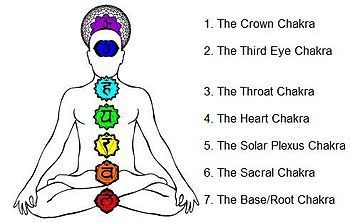 Similarly I attended a course in reiki because a friend wanted to do it. That was the first time I ever heard of the seven chakras or ‘energy centers’ in the body. I got initiated and it was all quite fascinating but again I never practiced it.
Similarly I attended a course in reiki because a friend wanted to do it. That was the first time I ever heard of the seven chakras or ‘energy centers’ in the body. I got initiated and it was all quite fascinating but again I never practiced it.Three years later another crisis led me to another wonderful teacher and this time I understood the power of reiki.
In a nutshell, I understood that while we have a physical body, a mental body and an emotional body, we also have an energy body. While conventional medicine treats the physical body, talk therapy is aimed at the mental body. And this process is kind of hit-and-miss.
But if you work on changing your energy, everything automatically changes.
At the core of all matter lies energy, and the human body is no different. The energy body is a template for the physical body. Emotional energy resonates with life experiences, personal and professional relationships, and belief systems and becomes literally encoded in cell tissue.
(from ‘Nourishing the Energy Body’ by Jule Klotter)
Our hands and legs and stomach look solid and material but in essence we are all vibrational beings.
… Every cell within (the body) is actually energy or light, vibrating at a slow enough rate to make it into visible physical matter. The human body, and the energy field which surrounds and interpenetrates it, is made up of electromagnetic energy, and every person has a unique vibrational energy signature, or frequency, in the same way as we all have unique fingerprints or DNA.
(from Self-Healing with Reiki by Penelope Quest)
I did not believe this stuff when I first heard it. It was like growing up in a world where you’re told the sun revolves around the earth. And then, some mad scientist proclaiming it’s the other way around.
The most wonderful thing, though, is it doesn’t matter. Even if you don’t believe in it, reiki works. The most amazing thing is that you can send reiki energy to someone far away and it works just as well (it’s called ‘distance healing’).
So what I am saying, in a nutshell, is that learning how to balance your energy body is the biggest gift you can give to yourself. But most of us – including me – are idiots and will be forced to discover these tools and techniques only through a crisis.
You get a chronic medical condition.
Your heart is broken by someone.
You fail at something important.
Now you are depressed and asking ‘why me’. You are a victim of repetitive thoughts and unanswerable questions. People tell you to ‘snap out of it’ but you can’t.
Yes, this is the time of your darkest night and your greatest opportunity. Grab it with both hands, close your eyes and place your trust in the Higher Power. You can and will emerge, a stronger and more vital human being.
I feel the need to share what I have learnt and experienced – over the last few years, and particularly, the last one month, because it’s so beautiful and so important. Yet it’s simply not a part of our ‘education’.
Maybe the knowledge I have gained at the mid-point of my life is something you can understand and apply much earlier ☺
Besides, I find it less and less interesting to comment on external events. Like the problem with the system, the country and the world. My attention at this moment is focused inwards, and that must necessarily reflect in what I write.
I ask only that you keep an open mind.
Tomorrow: The Art of Healing - II

Published on October 14, 2012 09:19
October 13, 2012
Vote for 'I Have a Dream' @ Crossword Book Awards
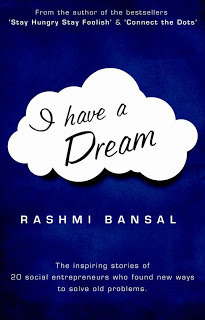
My book 'I Have a Dream' has been nominated for the Popular Book Award @ Crossword Book Awards 2012.
If you enjoyed it and would like to cast your vote, here's the link:
http://app1.juvlon.com/po/crossword/v...
Voting ends tomorrow :) ie midnight of Monday Oct 15.
It would be cool for a non-fiction title which celebrates the spirit of service to win against pure,timepass fiction!

Published on October 13, 2012 22:45
September 6, 2012
Paradise Lost?
The flight to Guwahati took 5 hours. Almost as long as it would to reach Singapore. Surely any state capital should have better connectivity…
What is the problem with Assam anyways? As we descend towards Lokanath Bordoloi airport I feel like this is God’s own country - mountains, lakes, lush green fields and the mighty Brahmaputra river.
People who live with nature are naturally peace-loving and simple folk. But those aren’t words you associate with Assam these days… I ask a local resident - let's call him Mr K - to explain to me ki yahan ho kya raha hai.
Well, he says, “It’s the classic case of local vs outsider.”
Thousands of Bangladeshi migrants cross the border every month. The going ‘rate’ for becoming an Indian citizen is Rs 500.
“You and I may not have a ration card but these people will have every proof of identity,” he adds.
What’s more, they will quickly learn Assamese, adopt some local customs and even names, to blend in with the local population.
“Being migrants they are more hungry, more hard-working and more cunning. A lot of land has been taken over by them.”
Seeing them make quick progress upsets the Bodos, who have traditionally dominated Lower Assam.
So, Mr K feels, it’s more of a battle over economic opportunity than religion. Yes, majority of migrants are Muslim but that is the incidental factor, not the main issue.
In any case, Assam is an industrial and economic pygmy. Mr K recounts stories of several corporates who came to the state, pledged to start operations and then backed out.
“Ratan Tata himself came to lay the foundation stone for a 5 star hotel. But the hotel never came up…”
Similarly, Apollo hospitals and Infosys too changed their mind and went elsewhere. Only because the government insisted on 90% reservation for locals.
So who exactly is a local? Mr K is originally from Rajasthan but his family has lived in Assam for close to 150 years.
“My grandfather’s grandfather came to Assam… My grandfather was born here, my father was born here, and I was born here.”
But Mr K will still not be treated as a ‘true Assamese’. Nor will his children.
“There is no discrimination as such but somewhere we know, we don’t have the same status – same shaan – as we would have, living in Rajasthan.”
Mr K runs an SSI unit in Guwahati and I wonder whether the current problems are affecting his business.
“No, because the agitations are in areas about 100 kms away from the city.”
But, constant bandhs and strikes do take a toll. And it is true that work culture in this part of the country is slothful.
“Government offices are supposed to function from 10 am to 5 pm. But at ten, you will see the officers – basket in hand – buying vegetables from the market.”
The wife will cook, husband will eat and by noon the attendance register will get a tick mark.
“Government jobs are the most coveted jobs in Northeast,” he adds.
Recently, the Assam government appointed 27,000 teachers at starting salaries of Rs 11,000-15,000. The grease money to get this job is Rs 50,000 to Rs 2 lakhs.
“But it’s like a lottery ticket. One time investment - no work, full pay!”
And that’s not the only lottery ticket in the state. ‘Donations’ to numerous organisations are compulsory and have to be treated as cost of doing business.
“If All Assam Students Union comes for chanda I know we have to cough up Rs 10,000. That’s the ‘fixed’ rate.”
While the Assamese accept this, the newcomers and the corporate houses cannot. And the market in Assam and Northeast isn’t even big enough to justify such headaches.
The only industry that has come up in recent times is cement - because limestone is available in plenty. The traditional business of tea, silk and handicrafts continue.
Mr K’s kids live far from Assam. And that is the story of majority of young people from the state.
“After class 10, children go out to study. And hardly any come back.”
Yes, the hills are blue and valleys green. But that is no longer enough.
Must hearts turn black and rivers run red, before we wake up, and do something?

Published on September 06, 2012 05:08
August 26, 2012
Hum honge kamyab... ek din
This afternoon I was looking for a good movie to watch on television. Instead, I found myself watching the men and women marching towards 7 Race Course Road, carrying the Indian Flag.
Who are these people who will spend their Sunday braving lathis and teargas shells?
Why are they so determined, so daring, so dedicated to the cause of India Against Corruption?
What did they hope to achieve today?

I believe India Against Corruption is a revolution. In fact, it is a second war for independence and no such war was ever won in a day.
When Team Anna’s second anshan ran out of steam, the cynics muttered ‘I told you so’. In a way, watching them ‘fail’ is reassuring for the vast majority who have merely been onlookers.. It confirms that we did the right thing by not moving our butts.
Because ‘ultimately kuch nahin ho sakta hai.’
It’s true. Itni jaldi kuch nahin ho sakta hai. The vast, deeply entrenched and securely guarded edifice of corruption in our country cannot be brought down in a day. Or a month, or a year, or even ten years.
But that cannot stop those who believe it can and must be brought down.
So far the IAC had but the passion of its foot soldiers. And the cannonball of media. Going forward, it will need new weapons, and tactics.
How will this campaign of the people and by the people stretch its tiny funds to fuel its giant ambitions?
Nobody knows but faith will keep them going.
Faith that one day, you and me, and all the citizens of this great country will rise up and stand with them. Because, truth can and must prevail.

Published on August 26, 2012 05:08
August 25, 2012
Your time starts now
 I love watching Masterchef Australia, and it’s not just for the food. In fact, being a vegetarian, the food aspect put me off, initially. I would squirm as contestants sliced and diced through meat and seafood to make it look pretty on a plate. But somehow, I got over that, and got hooked anyway.
I love watching Masterchef Australia, and it’s not just for the food. In fact, being a vegetarian, the food aspect put me off, initially. I would squirm as contestants sliced and diced through meat and seafood to make it look pretty on a plate. But somehow, I got over that, and got hooked anyway.What I truly love about Masterchef is how it can take ordinary people and induce them to do extraordinary things – because they’ve been challenged. Or, to be more precise, stressed, pressed, whipped, dipped and devilled into reaching somewhere deep and magical inside themselves.
Just about every dish contestants are asked to cook seems to be beyond the reach of an amateur. The time allotted always seems too less. Two minutes before, something is still cooking – the plate still empty! But somehow, almost always, it all comes together, and comes through.
On a good day – like Mindy had recently - the amateurs even manage to beat the spatulas off professional chefs.
The question that fascinates me, however, is can the process of producing a Masterchef be replicated? Not just in cooking, but for any other kind of skill or subject?
Let’s first examine how and what Masterchef does correctly. Number one – they select the right people, but not just those who can cook – in a technical sense. Along with kitchen skills the judges look at how passionate you are. How intense is your desire to be on the show? How badly do you want to win??
So, now you have a bunch of highly motivated, highly driven individuals who have shown some flair for cooking. In the traditional mode, it would take 3 years in a catering college to get a diploma. Even then, you’ll struggle for an entry-level position in a restaurant. And slowly work your way up.
At Masterchef, 3 years gets condensed to 3 months. And from day 1, you get exposure to top-level chefs. The best in the business come as trainers, mentors, judges and even to cook against you. The learning curve is steep, fast and furious.
The next thing that kicks in is ‘self-respect’. There you are, on national television - family and friends are watching. You have got to do your best. Or even better than best. Things you never even knew you were capable of.
And of course, the constraints and challenges are designed to make you jump out of your skin. An invention test, for example is about more than cooking. It’s about pulling something out of your hat. There is no time to think deeply, you simply direct yourself to ‘do what feels right’.
Which is the best way to do anything truly worthwhile in life.
Lastly, the winner takes it all but even the losers gain a lot. Many left mundane jobs to pursue their dream of a career in food. And hardly anyone goes back. There is no stigma of ‘failure’, in fact contestants feel like they’ve test marketed the idea and now have enough skills and confidence to make a run for it.
A takeaway business, a bakery, a cookbook or food blog – these are the outcomes you can hope for, even if you don’t get crowned as ‘Masterchef’.
That means ‘winning’ is great but it’s also a process designed to awaken the power within you. The power to become a winner, to make your dreams come true.
I know this kind of awakening is possible in every field of human endeavour.
And that ‘education’ must expand beyond degrees and certificates.
The real proof of the pudding must always be the quality of the pudding you produce.
And not the bowl it’s dressed up in, labelled IIT, IIM, Harvard or Stanford…

Published on August 25, 2012 03:39
Rashmi Bansal's Blog
- Rashmi Bansal's profile
- 534 followers
Rashmi Bansal isn't a Goodreads Author
(yet),
but they
do have a blog,
so here are some recent posts imported from
their feed.













